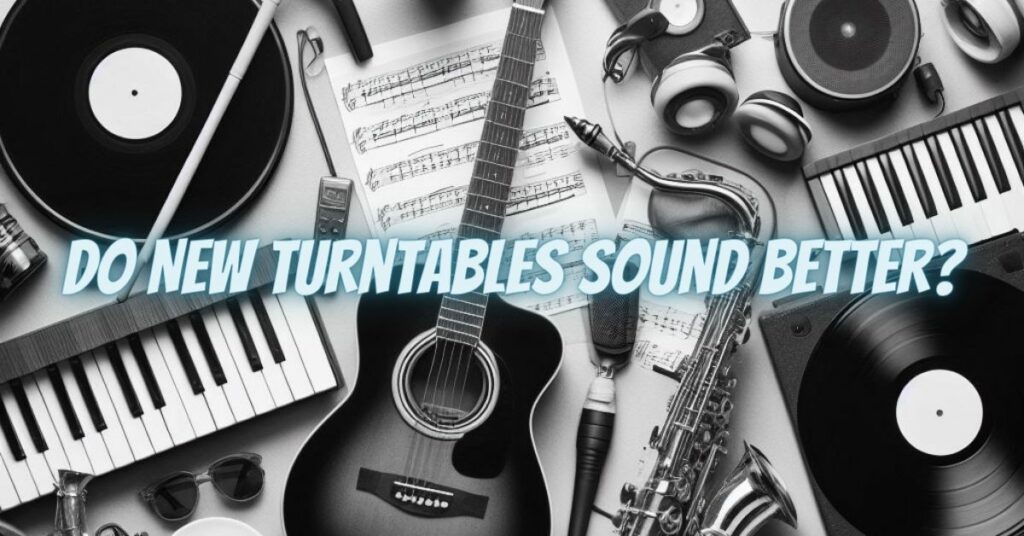The vinyl revival has taken the world by storm in recent years, with record sales reaching levels not seen in decades. This resurgence has sparked numerous debates and discussions about the quality of modern turntables compared to their vintage counterparts. Audiophiles, vinyl enthusiasts, and music lovers alike are pondering the question: do modern turntables sound better? In this article, we will delve into the evolution of turntable technology and discuss whether modern turntables truly offer superior audio quality.
The Resurgence of Vinyl
Vinyl records, once thought to be obsolete, have experienced a remarkable resurgence in popularity. Music enthusiasts have been drawn to the tactile and analog nature of vinyl, with its large album covers, manual handling, and warm sound. As a result, turntable manufacturers have responded with innovative designs and improved technology. To evaluate whether modern turntables sound better, it’s essential to consider various factors that have evolved over the years.
- Material and Build Quality
Modern turntables often benefit from advances in materials and manufacturing processes. These improvements have led to better isolation from vibrations, reduced resonance, and increased durability. High-quality materials such as carbon fiber and precision engineering have allowed modern turntables to minimize unwanted interference, resulting in cleaner sound reproduction.
- Motor and Drive Systems
One area of significant advancement in modern turntables is the motor and drive system. Older models typically used belt drives, which could be prone to speed variations. In contrast, modern turntables often feature direct-drive systems, which provide more consistent rotation and reduce wow and flutter, contributing to more accurate playback.
- Tonearms and Cartridges
Modern turntables often include more precise and adjustable tonearms, which are crucial in maintaining proper tracking and minimizing distortion. Furthermore, modern cartridges offer improved stylus shapes and materials, enhancing the extraction of details and reducing wear on records.
- Sound Isolation
Modern turntables are designed with better sound isolation in mind. These designs can minimize interference from external vibrations, making them more suitable for various listening environments. Isolation methods may include suspension systems, heavy plinths, and advanced dampening techniques.
- Convenience Features
Modern turntables often incorporate useful features like automatic start/stop, speed selection, and USB connectivity for digitizing your vinyl collection. While these features may not directly impact sound quality, they enhance the overall user experience and convenience.
- Compatibility and Connectivity
With the advent of modern technology, many turntables come equipped with connectivity options that allow you to integrate them with your existing audio system. This makes it easier to enjoy vinyl records in a modern setup while taking advantage of the latest audio equipment.
- Price Range
It’s important to note that the price range for modern turntables varies widely. While high-end models can offer exceptional sound quality, entry-level options may not perform as well as vintage turntables of a similar price point. Therefore, the correlation between modern turntable sound quality and price can be a crucial consideration.
The question of whether modern turntables sound better than their vintage counterparts doesn’t have a one-size-fits-all answer. Modern turntables have made significant advancements in terms of material quality, motor systems, tonearms, and sound isolation. These improvements, when properly designed and engineered, can lead to superior sound quality compared to some older turntables.
However, the vinyl playback experience is not solely defined by the turntable itself. The quality of the vinyl record, the condition of the stylus, the tonearm setup, and the rest of your audio system play equally important roles in determining the overall sound quality. Additionally, personal preferences and the nostalgic appeal of vintage equipment also factor into one’s perception of sound quality.
In the end, the question of whether modern turntables sound better is subjective. It depends on your specific needs, preferences, and budget. The best way to decide is to listen to different turntables, both vintage and modern, and consider the complete audio setup before making your choice. Whether you opt for a vintage turntable or a modern one, the joy of vinyl records lies in the experience of music and the connection to its timeless, analog charm.


